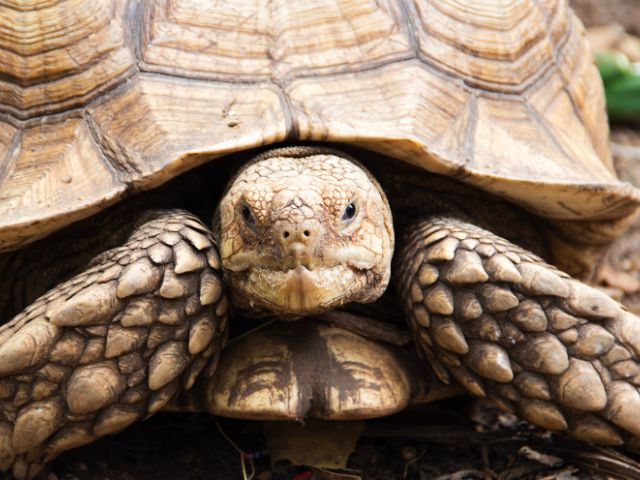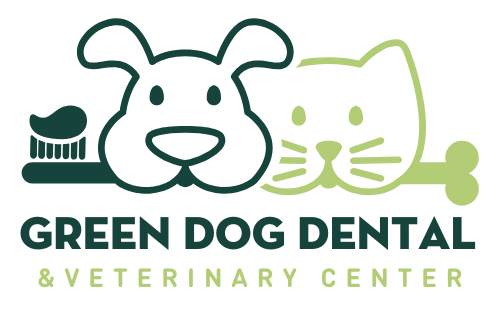Tortoise Care at Green Dog Dental & Veterinary Center in Van Nuys, CA
Tortoises are remarkable, long-lived reptiles with highly specific environmental and nutritional needs. They demand precision: the right heat gradients, the correct humidity ranges, balanced herbivorous diets, and enclosures that mirror the conditions of their native ecosystems. At Green Dog Dental & Veterinary Center, our exotic animal team delivers advanced tortoise veterinary care for species like sulcata tortoises, Russian tortoises, Greek tortoises, Hermann’s tortoises, leopard tortoises, and other land-dwelling Testudinidae.
If you’re searching for a tortoise vet near Van Nuys or a reptile vet in CA, our clinicians are equipped to diagnose, treat, and guide you through every aspect of proper tortoise husbandry. Exceptional care starts with exceptional understanding — and tortoises require both.

What Makes Tortoises Unique?
Tortoises are reptiles, but they stand apart even within their class. They are strictly terrestrial, breathing air, regulating body temperature through external heat sources, and carrying dense, dome-shaped shells developed for life on land. Unlike aquatic turtles, tortoises do not swim, and they lack the anatomical adaptations that would allow them to do so safely.
Key distinctions include:
- Land-exclusive lifestyle — no deep water, no swimming
- Heavier, dome-shaped shells designed for protection
- Herbivorous dietary patterns
- Long lifespans, often spanning multiple generations
Knowing these differences is essential, because a tortoise’s health is tightly linked to a controlled environment that respects its natural biology.
How Long Do Tortoises Live?
One of the most captivating aspects of tortoise ownership is their astonishing longevity. Depending on species, lifespans often exceed those of most domestic pets:
- Russian tortoises: 40–50+ years
- Greek and Hermann’s tortoises: 50–75 years
- Leopard tortoises: 50–100 years
- Sulcata tortoises: 80–100+ years
- Aldabra and Galápagos tortoises: 100–150+ years
With decades of life ahead, consistent husbandry and regular exams at Green Dog Dental & Veterinary Center become essential to preventing disease early, before subtle issues develop into chronic or irreversible conditions.
What Do Tortoises Eat?
Most tortoises are strict herbivores. They do not require animal protein, insects, or commercial dog/cat food — and in fact, these foods can be harmful. Their diet should reflect the high-fiber, low-protein vegetation found in their natural habitats.
Daily Greens
These should form the bulk of their diet:
- Collard greens
- Dandelion greens
- Mustard greens
- Endive
- Turnip greens
- Escarole
Vegetables in Moderation
Due to their higher sugar or moisture content:
- Squash
- Bell pepper
- Carrot tops
- Green beans
High-Fiber Plants
Critical for digestive and shell health:
- Grasses and weeds
- Opuntia cactus pads (prickly pear)
- Mulberry leaves
Occasional Items
For enrichment, not daily feeding:
- Hibiscus flowers
- Safe wild weeds (clover, plantain, sow thistle)
Items to Avoid
These foods interfere with nutrient absorption or digestion:
- Lettuce (nutrient-poor)
- Spinach, beet greens (bind calcium)
- Fruit (causes digestive upset in most species)
- Dog/cat food (dangerously high in protein)
Because species originate from different climates and foraging environments, dietary needs must reflect where your tortoise evolved. During a wellness visit, our exotic veterinarians can help tailor a feeding plan that aligns with your tortoise’s natural ecology.
Tortoise Enclosure Requirements
A tortoise’s enclosure is not optional enrichment — it is a medical necessity. Poor housing leads directly to shell deformities, metabolic deficiencies, respiratory disease, and chronic stress.
Indoor Housing
Tortoises should not be kept in aquariums. Glass tanks trap humidity, restrict airflow, and are far too small for natural roaming behavior. Instead, opt for:
- Tortoise tables
- Modified wooden enclosures
- Custom-built indoor pens
Appropriate Substrate
Safe choices include:
- Coconut coir
- Organic topsoil
- Orchard grass hay
- Cypress mulch
Avoid sand-only setups and gravel, which can cause impaction or injury.
Lighting & Heat
Every tortoise enclosure must provide:
- UVB lighting (critical for calcium absorption and bone health)
- Basking area: typically 90–100°F depending on species
- Cool side: 70–80°F
- 12-hour light/dark cycle
Without UVB exposure, tortoises are at high risk for metabolic bone disease.
Outdoor Housing Advantages
When climate and safety allow, tortoises thrive outdoors. Natural sunlight offers superior UVB exposure, and outdoor pens support healthier grazing and more natural behavior. Outdoor setups should include:
- Sun and shade options
- Grass or soil substrates
- Secure, predator-proof fencing
- Escape-proof barriers
Sulcata and leopard tortoises especially benefit from outdoor housing due to their size and activity levels.
Humidity Requirements
Humidity must match the species — a detail often overlooked but essential to preventing shell pyramiding and dehydration.
- Russian, Greek, Hermann’s: 40–60%
- Leopard: 40–55%
- Sulcata (especially juveniles): 50–70%
Green Dog Dental & Veterinary Center can help you fine-tune humidity levels based on your enclosure setup and local climate.
Do Tortoises Hibernate or Brumate?
Some tortoise species — particularly Mediterranean types like Russian or Greek tortoises — do brumate. Others, including sulcata and leopard tortoises, do not.
Brumation should never be attempted without veterinary oversight. Incorrect temperatures, timing, or pre-brumation health status can lead to dehydration, organ failure, or death. Our team can assess your tortoise’s species, age, and condition to determine whether brumation is appropriate and how to manage it safely.
Normal Tortoise Behaviors
Healthy tortoises typically:
- Explore their environment
- Graze throughout the day
- Dig and burrow
- Bury partially for thermoregulation
- Bask predictably
- Withdraw into their shell when startled
- Show curiosity toward objects or food
They do not have teeth; instead, they rely on keratin beaks — which can become overgrown when diet or chew options are inadequate. And despite common myths, tortoises cannot swim.
Common Tortoise Health Issues
Even slight deviations in diet, humidity, or lighting can lead to significant medical problems. The most frequently seen conditions include:
- Metabolic bone disease
- Shell pyramiding
- Respiratory infections
- Internal or external parasites
- Beak overgrowth
- Dehydration or constipation
- Shell rot
- Kidney or liver disease
Because tortoises hide symptoms well, early detection is essential.
Signs Your Tortoise Needs a Veterinarian
Contact Green Dog Dental & Veterinary Center immediately if you notice:
- Poor appetite or refusal to eat
- Noisy breathing or nasal discharge
- Soft areas or white patches on the shell
- Lethargy
- Swollen eyes
- Weight loss
- Difficulty walking
- Runny stools or extremely dry stools
- Beak overgrowth or chewing difficulty
Prompt care often prevents conditions from progressing into long-term complications.
General Tortoise Care Tips
- Soak young tortoises 2–3 times weekly to prevent dehydration
- Offer cuttlebone as a calcium source
- Keep enclosures clean, dry, and well-ventilated
- Rotate greens for nutritional variety
- Avoid mixing species
- Provide hides for security
- Ensure outdoor enclosures are escape-proof
Schedule a Tortoise Wellness Exam at Green Dog Dental & Veterinary Center
Whether you’re caring for a sulcata, Russian, Greek, leopard, or Hermann’s tortoise, high-quality veterinary oversight is essential for long-term health. If your tortoise isn’t eating normally, seems less active, or if you need guidance on diet, humidity, or enclosure setup, our exotic animal team is here to help.
Call us at (310) 606-2407 or email [email protected] to schedule your tortoise exam.
Don't forget to follow us on social media: Facebook, Instagram.
